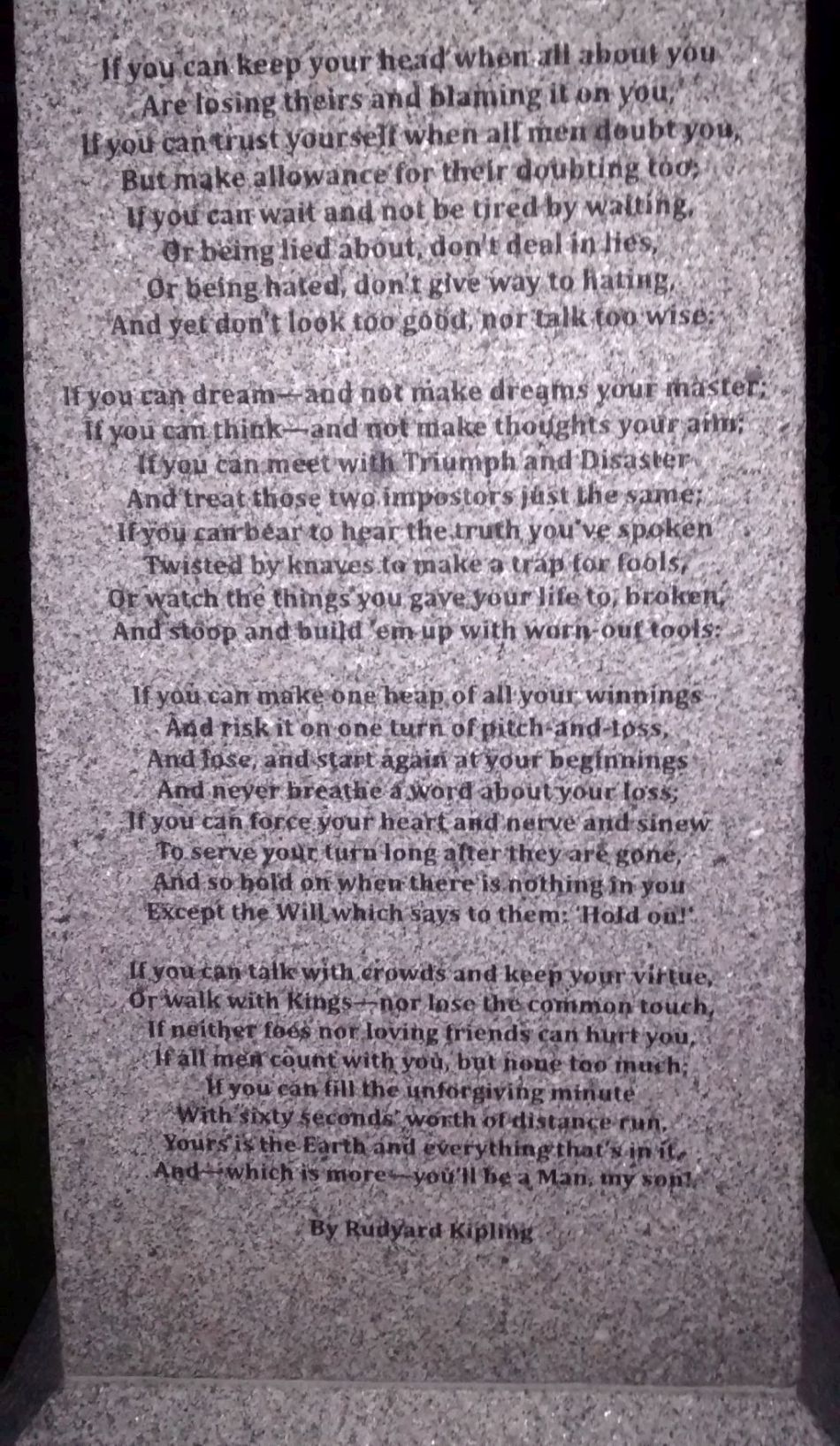|
WISE
24/11/2014
VANITY -
(Vaidade) Out
of:
Collected Stories - by
Somerset Maughan - 20-May-08
(Story
:
“His Excellency” - Page
808
) -
R.Kipling's -IF-on the Obelisk
...
"All
sensible people know that vanity
is the most
devastating, the most universal, and
the most ineradicable of the
passions that afflict the soul of
man, and it is only vanity that
makes
him deny its power. It is more
consuming than love. With
advancing years, mercifully, you can
snap your fingers at the terror
and the servitude of love, but age
cannot free you from the thraldom
(condition, servitude) of
vanity. Time can assuage
the
pangs of love, but only death can
still the anguish of wounded
vanity. Love is simple and
seeks no subterfuge, but
vanity
cozens you with hundreds disguises.
It is part and parcel of every virtue: it is the mainspring of courage and the strength of ambition; it gives constancy to the lover and endurance to the stoic; it adds fuel to the fire of the artists desire for fame and is at once the support and the compensation of the honest man's integrity; It leers even cynically in the humility of the saint. You cannot escape it, and should you take pains to guard against it, it will make use of those very pains to trip you up. You are defenseless against its onslaught because you know not on what unprotected side it will attack you. Sincerity cannot protect you from its snare nor humor from its mockery." - vanity. . . = = = = = = =
= = = = = = = = = = = =
= = = = = = =
Book
of
Sirach
3:17-18.20.28-29.
( Sept. 2016 )
My child, conduct your affairs with humility, and you will be loved more than a giver of gifts. Humble yourself the more, the greater you are, and you will find favor with God. What is too sublime for you, seek not, into things beyond your strength search not. The mind of a sage appreciates proverbs, and an attentive ear is the wise man's joy. Water quenches a flaming fire, and alms atone for sins. |


Irving Family Tomb - Fernhill Cemetery

INDICE - TOPO
|
.
29
Apr 2000 21:31:32 -0400
Manfred
Frischeisen - Venezuela -
<yakoo@cantv.net>FROM
the
DALAI LAMA: I N
S T R U C T I O N S
for L I F E
1.
Take into account that
great love and great achievements
involve great risk;2. When you lose, don't lose the lesson; 3. Follow the three Rs: Respect for self - Respect for others and Responsibility for all your actions. 4. Remember that not getting what you want is sometimes a wonderful stroke of luck. 5. Learn the rules so you know how to break them properly. 6. Don't let a little dispute injure a great friendship. 7. When you realize you've made a mistake, take immediate steps to correct it. 8. Spend some time alone every day. 9. Open your arms to change, but don't let go of your values. 10. Remember that silence is sometimes the best answer. 11. Live a good, honorable life. Then when you get older and think back, you'll be able to enjoy it a second time. 12. A loving atmosphere in your home is the foundation for your life. 13. In disagreements with loved ones, deal only with the current situation. Don't bring up the past. 14. Share your knowledge. It's a way to achieve immortality. 15. Be gentle with the earth. 16. Once a year, go someplace you've never been before. 17. Remember that the best relationship is one in which your love for each other exceeds your need for each other. 18. Judge your success by what you had to give up in order to get it. 19. Approach love and cooking with reckless abandon. |
|
<< A PSALM of LIFE
>>
WHAT THE HEART OF THE YOUNG MAN SAID TO THE PSALMIST TELL me not, in mournful numbers, Life is but an empty dream! — For the soul is dead that slumbers, And things are not what they seem. . Life is real ! Life is earnest! And the grave is not its goal; Dust thou art, to dust returnest, Was not spoken of the soul. . Not enjoyment, and not sorrow, Is our destined end or way; But to act, that each to-morrow Find us farther than to-day. . Art is long, and Time is fleeting, And our hearts, though stout and brave, Still, like muffled drums, are beating Funeral marches to the grave. . In the world's broad field of battle, In the bivouac of Life, Be not like dumb, driven cattle! Be a hero in the strife ! . Trust no Future, however pleasant! Let the dead Past bury its dead! Act,— act in the living Present! Heart within, and God overhead! . Lives of great men all remind us We can make our lives sublime, And, departing, leave behind us Footprints on the sands of time; . Footprints, that perhaps another, Sailing o'er life's solemn main, A forlorn and shipwrecked brother, Seeing, shall take heart again. . Let us, then, be up and doing, With a heart for any fate; Still achieving, still pursuing, Learn to labor and to wait. = = = = = = = = = = = = = = = = = = ...last
line of an Irish prayer :
<<
...and may God hold you in the hollow of
His hand!
>> |
INDICE
|
.
“Mensch, erkenne dich selbst, dann weißt
du alles”.
==
= = = = = = = = = = = = = = = =
08-Feb-09
Aphorism Zur Lebens
Weisheit Arthur Schoppenhauer - Seite 122 ...wer also nicht die Einsamkeit liebt, der liebt auch nicht die Freiheit, denn nur wann man allein ist, ist man frei. Zwang ist unzertrennliche Gefaehrte jeder Gesellschaft, und jede fordert Opfer, die um so schwer fallen je bedenkender die eigene Individualitaet ist! Demgemaess wird jeder in genauer Proportion zum Werte seines Sebst die Einsamkeit fliehen, ertragen, oder lieben. Ferner, je hoeher einer auf der Rangliste der Natur steht, desto einsamer steht er..... =
= = = = = = = = = = = = = = = = = =
Ein
'Hauptstudium'
der Jugend sollte sein,“die Einsamkeit
ertragen zu
lernen”,weil sie eine Quelle des
Glueckes,der Gemuetsruhe ist.
Hievon ist die Zurrueckgezogenheit
jedes
Wuerdigen
und Ausgeglichenen der Beweis und die
Folge.
Arthur Schopenhauer: Aphorismen
zur Lebensweisheit
Die
Aphorismen
zur Lebensweisheit sind Arthur
Schopenhauers populärste
Schrift und bilden den zweiten Teil seiner
Parerga und Paralipomena.
Kleine Philosophische Schriften (1851).
Der Philosoph bietet darin
praktische Ratschläge zu einem glücklichen
Leben nach Vorgabe seiner
quietistischen, individualistisch-elitären
Grundhaltung. Sprachlich
prägnant und mit großem psychologischen
Scharfsinn vermittelt
Schopenhauer einen Weg zum persönlichen
Glück in einer feindlich
empfundenen Lebenswelt. Pointiert und oft
auch sarkastisch bestimmt er
systematisch vorgehend die relevanten
Kategorien.Arthur Schopenhauer: Aphorismen zur Lebensweisheit . Kapitel II. Von Dem, was Einer ist. . Daß Dieses zu seinem Glücke viel mehr beiträgt, als was er hat, oder was er v o r s t e l l t, haben wir bereits im Allgemeinen erkannt. Immer kommt es darauf an, was Einer sei und demnach an sich selber habe: denn seine Individualität begleitet ihn stets und überall, und von ihr ist Alles tingirt [eingefärbt], was er erlebt. In Allem und bei Allem genießt er zunächst nur sich selbst: Dies gilt schon von den physischen; wie viel mehr von den geistigen Genüssen. Daher ist das Englische to enjoy one’s self ein sehr treffender Ausdruck, mit welchem man z. B. sagt he enjoys himself at Paris, also nicht „er genießt Paris”, sondern „er genießt s i c h in Paris.” – Ist nun aber die Individualität von schlechter Beschaffenheit; so sind alle Genüsse wie köstliche Weine in einem mit Galle tingirten Munde. Demnach kommt, im Guten wie im Schlimmen, schwere Unglücksfälle bei Seite gesetzt, weniger darauf an, was Einem im Leben begegnet und widerfährt, als darauf, wie er es empfindet, also auf die Art und den Grad seiner Empfänglichkeit in jeder Hinsicht. Was Einer in sich ist und an sich selber hat, kurz die Persönlichkeit und deren Werth, ist das alleinige Unmittelbare zu seinem Glück und Wohlseyn. Alles Andere ist mittelbar; daher auch dessen Wirkung vereitelt werden kann, aber die der Persönlichkeit nie. Darum eben ist der auf persönliche Vorzüge gerichtete Neid der unversöhnlichste, wie er auch der am sorgfältigsten verhehlte ist. . Ferner ist allein die Beschaffenheit des Bewußtseyns das Bleibende und Beharrende, und die Individualität wirkt fortdauernd, anhaltend, mehr oder minder in jedem Augenblick: alles Andere hingegen wirkt immer nur zu Zeiten, gelegentlich, vorübergehend, und ist zudem auch noch selbst dem Wechsel und Wandel unterworfen: daher sagt Aristoteles: ‘h gar ?u??V ?e?a?a, ou ta crhµata (nam natura perennis est, non opes). [Denn die Natur ist zuverlässig, nicht das Geld.] Eth. Eud. VII, 2. Hierauf beruht es, daß wir ein ganz und gar von außen auf uns gekommenes Unglück mit mehr Fassung ertragen, als ein selbstverschuldetes: denn das Schicksal kann sich ändern; aber die eigene Beschaffenheit nimmer. Demnach also sind die subjektiven Güter, wie ein edler Charakter, ein fähiger Kopf, ein glückliches Temperament, ein heiterer Sinn und ein wohlbeschaffener, völlig gesunder Leib, also überhaupt mens sana in corpore sano [ein gesunder Geist in gesundem Körper] (Juvenal. Sat. X, 356), zu unserm Glücke die ersten und wichtigsten; weshalb wir auf die Beförderung und Erhaltung derselben viel mehr bedacht seyn sollten, als auf den Besitz äußerer Güter und äußerer Ehre. |
|
.
Oliver
Goldsmith ( 1728 – 1774 )
:
Nur
auf
uns selbst sind wir stets
angewiesen,
Horaz
erzaehlt:An allen Orten und zu allen Zeiten, Darum willst du Glueckseligkeit geniessen, So kannst du sie nur selber dir bereiten - ( “The Traveller” – 1776 ) ========================== “Ein jeder messe sich nach seinem eigenen Mass, das ist die wahre Weisheit. >> ==========================
”Otium…sepulture”
=Musse ohne geistige Beschaeftigung ist der Tod und ein ‘Lebendigbegrabensein’ des Menschen (Seneca – “Epistulae morales ad Lucilium”) ==========================
”Wahrer
Reichtum
ist nur der innere Reichtum der
Seele,
Alles uebrige bringt Ungemach mehr als Gewinn” =========================
“Das
glueckliche Leben ist das jenige, in
welchem die Tuechtigkeit sich
ungehindert entfalten kann”
(Aristóteles – “Politiks”) |